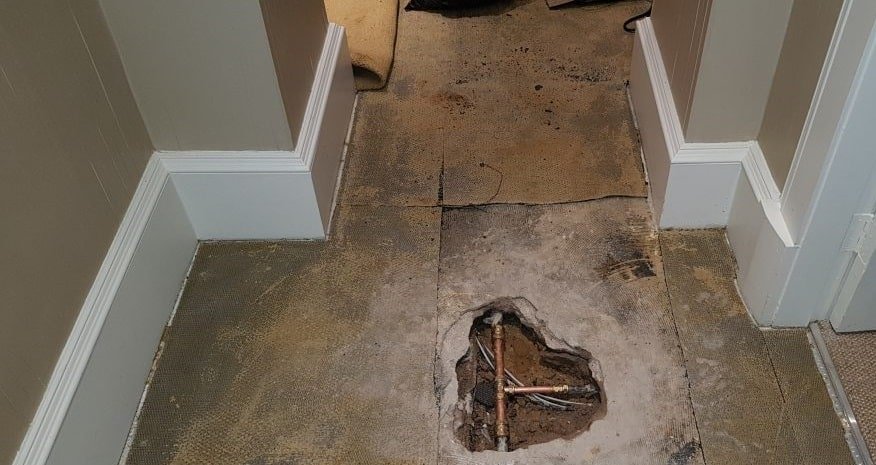Water under your concrete slab spells trouble. Pipes lie beneath these hard surfaces, carrying sewage and water to and from your home. A damaged pipe can leak, harming the foundation over time.
Detection is tricky; signs like running water sounds or basement seepage aren’t always clear. Professional tools often become necessary for spotting such leaks accurately, especially since causes vary widely, from faulty construction practices to shifts in soil or even an aged structure’s wear and tear. Early detection is crucial for mitigating damage.
Detecting Water Beneath Concrete Slabs
Look for signs like warped floors or moldy smells to find water under a slab. Slabs hide pipes that can break and leak. A pro uses special gear to spot these leaks; no guesswork is needed.
If your bill spikes or the floor heats up at random spots, you might have a problem down there—a slab leak, perhaps. Homes age, earthquakes shake, and these are factors beyond our control. But what if corners were cut during build time with bad concrete work?
Watching for trouble early stops big repair bills later on. Think you’ve got a sneaky leak? Time to call in pros who know how to track it without wrecking your place.
Consequences of Sub-Slab Water Intrusion
If water gets under your concrete slab, big problems can follow. The soil below should stay dry. But when it doesn’t, moisture creeps up due to missing or faulty vapor barriers – a process called capillary action.
Imagine the damage: floors swell or bulge out of place as adhesives give way. Stick to industry standards to prevent this mess. ASTM International outlines how and which vapor retarders must be used beneath slabs. They’re key in keeping flooring intact by blocking dampness from rising.
So what if there’s no barrier? You may face swollen floors and costly repairs later because, without one, even ground moisture becomes an invisible enemy to your home’s foundation.
Addressing Hidden Leaks in Concrete Foundations
Water hides below your house, and it can cause big trouble. Pipes sometimes crack, or their joints may fail under the foundation, causing a slab leak! When water escapes, soil erodes, and the support for your concrete vanishes.
Imagine more weight piling on a weakened structure; cracks might just appear. Now, think of all this moisture slipping into your living space.
Water damage could ruin everything from couches to fridges, warp floors, and stain walls. Fixing leaks buried beneath tons of concrete is no easy feat; it’s far beyond what you should tackle alone. Different pipes also play roles in these leaks; not just any material but how old they are matters.
If water seeps under a concrete slab, it can cause major issues. The soil may erode, causing gaps and the slab to crack or shift. If you spot signs of this at your home, like changes in flooring or cracks, contact us immediately.
Courtesy Plumbing specializes in detecting and fixing such problems efficiently before they worsen. Remember, addressing these concerns early helps avoid more costly repairs. Stay vigilant for any shifts in your property’s foundation; it could save you time and money.







